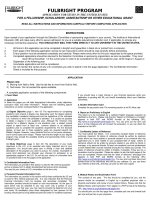vật lý bằng tiếng anh hay nhất
Bạn đang xem bản rút gọn của tài liệu. Xem và tải ngay bản đầy đủ của tài liệu tại đây (304.07 KB, 12 trang )
For Examiner’s Use
Candidate Number
Centre Number
Surname
Other Names
Examiner’s Initials
Candidate Signature
Question
General Certificate of Education
Advanced Level Examination
June 2011
1
2
Physics
PHA6/B6/XPM1
(Specifications A and B)
Unit 6
Mark
TOTAL
Investigative and Practical Skills in A2 Physics
Route X Externally Marked Practical Assignment (EMPA)
Section A
Part 1
For this paper you must have:
l a calculator
l a pencil
l a ruler.
Instructions
l
l
l
l
l
l
Use black ink or black ball-point pen.
Fill in the boxes at the top of this page.
Answer all questions.
You must answer the questions in the spaces provided. Do not write outside
the box around each page or on blank pages.
Show all your working.
Do all rough work in this book. Cross through any work you do not want
to be marked.
Information
l
l
The marks for questions are shown in brackets.
The maximum mark for Section A Part 1 is 15.
(JUN11PHA6B6XPM101
WMP/Jun11/PHA6/B6/XPM1
PHA6/B6/XPM1
2
Section A
Do not write
outside the
box
Part 1
Follow the instructions given below.
Answer all the questions in the spaces provided.
No descriptions of the experiments are required.
1 You are to investigate how the amplitude of a simple pendulum diminishes as its energy
becomes absorbed by the surrounding air.
A golf ball is suspended from a string to form a simple pendulum.
Do not adjust the length of the pendulum or the height above the floor of the clamped end of
the thread.
Put the ruler on the floor with the graduated face uppermost.
Place the brick on the ruler so the smallest surface of the brick is in contact with the ruler
and a smooth vertical face of the brick faces the golf ball.
This nearest face of the brick should be 30.0 cm from the golf ball, as shown in Figure 1.
The axis of the ruler should be parallel to the edge of the bench and the zero graduation
directly below the edge of the golf ball closest to the brick.
Figure 1
ruler parallel to the
edge of the bench
view from the side
WMP/Jun11/PHA6/B6/XPM1
7
floor
6
zero graduation 30.0 cm graduation
of the ruler
of the ruler
5
brick with smallest
surface resting on
the ruler
4
golf ball
3
2
1
view from directly above
3
Do not write
outside the
box
1 (a)
Keeping the string straight, pull the golf ball to one side, so it touches the brick.
Release the golf ball so that it performs simple harmonic motion in a vertical plane,
directly above the ruler.
1 (a)
(i)
Record in the table below, An, the amplitude of the oscillation of the golf ball
after n oscillations have been completed; use the values n = 10, 20 and 30
indicated in the table.
The table has been partly completed for you.
Use the additional columns in the table as required, to record repeated
measurements.
An the amplitude of the pendulum after n oscillations
n
An / cm
An / cm
mean
An / cm
0
30.0
30.0
30.0
10
20
30
Determine the mean value of An after 10, 20 and 30 oscillations of the pendulum.
Record these data in the right-hand column of the table.
1 (a)
(ii)
1 (a)
(iii) Use your data to calculate Δ A10, the uncertainty in A10, the amplitude after
10 oscillations.
...................................................................................................................................
...................................................................................................................................
...................................................................................................................................
...................................................................................................................................
...................................................................................................................................
Δ A10 = ..............................................................
(2 marks)
Question 1 continues on the next page
Turn over ᮣ
WMP/Jun11/PHA6/B6/XPM1
4
1 (b)
Textbooks suggest that under certain conditions the amplitude of a simple pendulum
subject to air damping should decrease exponentially.
A teacher says that if the suggestion is correct, then
An
= constant.
An+10
Perform suitable calculations with your data from part (a) to test the teacher’s idea.
State and explain your conclusion.
.............................................................................................................................................
.............................................................................................................................................
.............................................................................................................................................
.............................................................................................................................................
.............................................................................................................................................
(2 marks)
1 (c)
Using the same apparatus as in part (a), a student designs a different experiment in
which energy is absorbed.
The apparatus is to be arranged as shown in Figure 2 so that when at the equilibrium
position, the golf ball rests against the brick.
The ruler is parallel to the bench and perpendicular to the brick. The graduated face of
the ruler is uppermost with the zero graduation in contact with the brick.
Figure 2
brick with smallest
surface resting on
the floor
30 cm graduation
of the ruler
zero graduation
of the ruler
floor
WMP/Jun11/PHA6/B6/XPM1
Do not write
outside the
box
5
Do not write
outside the
box
Keeping the ball vertically above the ruler and the string straight, the golf ball is pulled
to one side until displaced 30.0 cm horizontally and then released so it swings back to
strike the brick.
A student intends to measure B, the amplitude of the oscillation of the golf ball after it
has rebounded from the brick and intends to investigate whether the amplitude of the
oscillation of the golf ball decreases exponentially.
The student intends to check this by calculating
Bn
, where Bn is the amplitude
Bn+1
after striking the brick n times, and Bn+1 is the amplitude after striking the brick
(n + 1) times.
Use the apparatus provided for part (a) to try out the student’s idea and hence identify
two difficulties in the procedure.
First difficulty ....................................................................................................................
.............................................................................................................................................
.............................................................................................................................................
.............................................................................................................................................
.............................................................................................................................................
Second difficulty ................................................................................................................
.............................................................................................................................................
.............................................................................................................................................
.............................................................................................................................................
.............................................................................................................................................
(2 marks)
6
Turn over ᮣ
WMP/Jun11/PHA6/B6/XPM1
6
There are no questions printed on this page
DO NOT WRITE ON THIS PAGE
ANSWER IN THE SPACES PROVIDED
WMP/Jun11/PHA6/B6/XPM1
7
Do not write
outside the
box
2 You are to measure the output voltage of a solar cell as the intensity of light incident on it is
varied by passing the light through two identical polarising filters.
The general arrangement and method of assembly is shown in top and side view in Figure 3.
Figure 3
top view
method of assembly
(view from above)
tape
solar cell mounted
on top of box
cylindrical tube
solar cell
mounted on
top of box
filter F1 placed on solar cell
filter F1
side view
box fixed
to bench
filter F1 taped to solar cell
Filter F1 has been taped to the surface of the solar cell that is sensitive to light.
The cell has been mounted on a box which has been fixed to the bench.
A cylindrical tube has been placed around this arrangement to shield it from unwanted light.
Place the circular scale centrally on top of the cylindrical tube with the printed side
uppermost and fix this to the tube using Blu-Tack.
Position the clamped light source so that the lamp is directly above the hole in the circular
scale.
Do not adjust the height of the lamp or the output voltage of the power supply.
The filter F2 has been mounted between two pieces of circular card.
2 (a)
(i)
Position this card centrally on the circular scale so that θ, the direction of the
arrow = 0°. Switch on the lamp then read and record the voltmeter reading V0.
V0 = ..............................................................
Question 2 continues on the next page
Turn over ᮣ
WMP/Jun11/PHA6/B6/XPM1
8
2 (a)
(ii)
Keeping the card centrally on the scale, increase θ in 20° steps to obtain further
values of V to complete the table.
Switch off the lamp once you have completed these measurements.
θ/°
V / mV
θ/°
V / mV
θ/°
20
140
260
40
160
280
60
180
300
80
200
320
100
220
340
120
240
360
V / mV
(1 mark)
2 (b)
Adding a suitable scale to the vertical axis, plot on the grid on page 9 a graph of your
results from part (a)(ii).
(2 marks)
2 (c)
(i)
Read from your graph, and record below, Vmax and Vmin, the maximum and
minimum values of V.
Vmax = ..............................................................
Vmin = ..............................................................
2 (c)
(ii)
Hence estimate the amplitude, A, of the variation V with θ.
A = ..............................................................
2 (c)
(iii) Identify and explain from your graph any value of θ for which the experimental
arrangement is most sensitive to changes in θ.
...................................................................................................................................
...................................................................................................................................
...................................................................................................................................
...................................................................................................................................
(3 marks)
WMP/Jun11/PHA6/B6/XPM1
9
θ /°
V / mV
0
40
80
120
160
200
240
280
320
360
Do not write
outside the
box
Question 2 continues on the next page
WMP/Jun11/PHA6/B6/XPM1
Turn over ᮣ
10
2 (d)
A student performs the experiment but fails to keep the edge of the card containing the
filter F2 centrally on the circular scale.
2 (d)
(i)
Do not write
outside the
box
State and explain the effect this may have on the readings of V.
...................................................................................................................................
...................................................................................................................................
...................................................................................................................................
...................................................................................................................................
...................................................................................................................................
...................................................................................................................................
2 (d)
(ii)
State one procedure that the student could take so that this error can be avoided.
...................................................................................................................................
...................................................................................................................................
...................................................................................................................................
...................................................................................................................................
(3 marks)
9
END OF SECTION A PART 1
WMP/Jun11/PHA6/B6/XPM1
11
There are no questions printed on this page
DO NOT WRITE ON THIS PAGE
ANSWER IN THE SPACES PROVIDED
WMP/Jun11/PHA6/B6/XPM1
12
There are no questions printed on this page
DO NOT WRITE ON THIS PAGE
ANSWER IN THE SPACES PROVIDED
Copyright © 2011 AQA and its licensors. All rights reserved.
WMP/Jun11/PHA6/B6/XPM1









